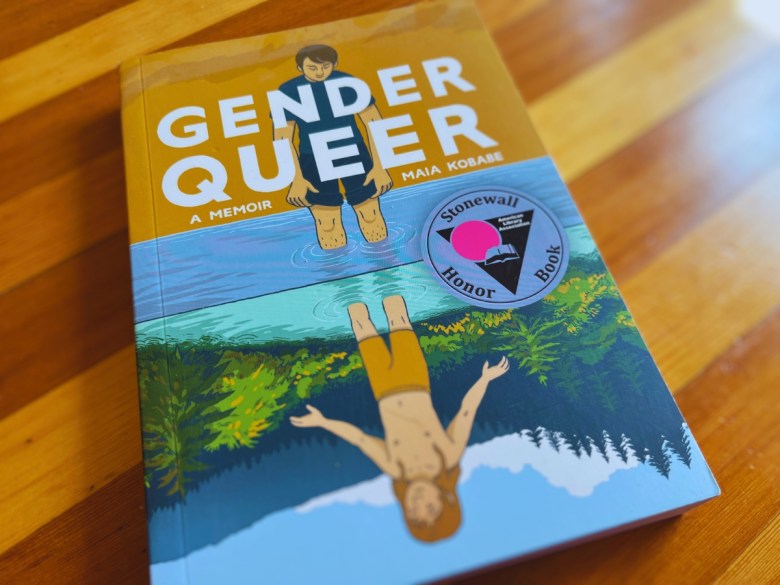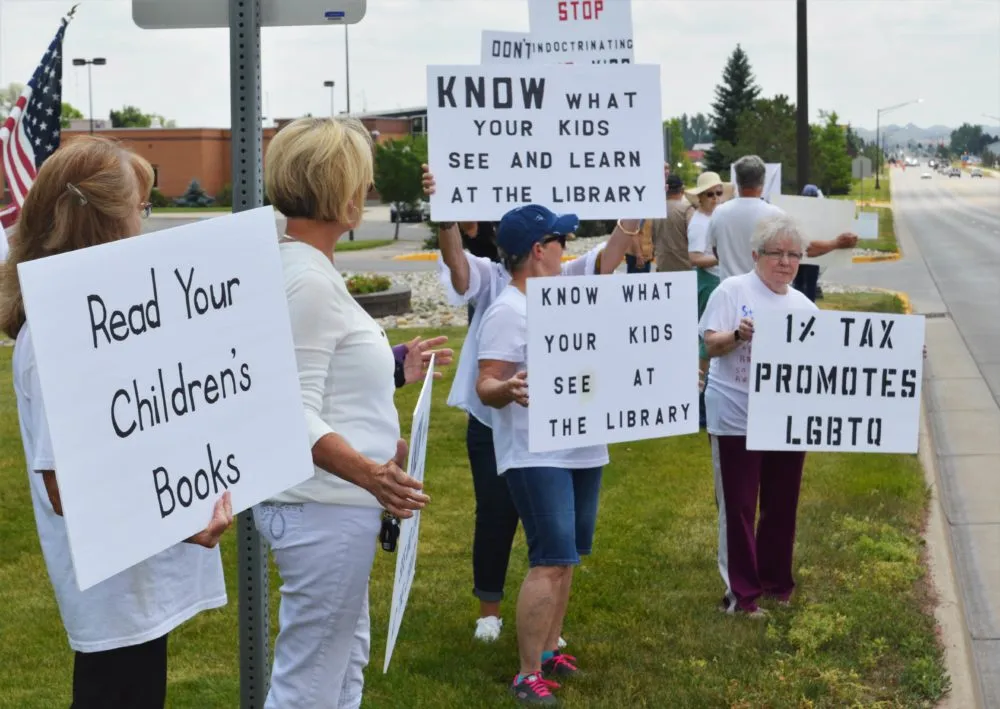by Andrew Graham, WyoFile
A Wyoming legislative panel on Monday endorsed a bill that would dictate where libraries shelve certain books, lending strong support to a measure that has drawn deep opposition from activists and advocates ahead of the 2026 legislative session.
After repeatedly revising the bill over nearly three hours of discussion, the Joint Judiciary Committee voted 11-2 to sponsor legislation that would allow people to sue public libraries and school districts if they find books containing sexually explicit material — which would be newly defined in Wyoming law under the bill — in areas accessible to minors.
Albany County Republican Sen. Gary Crum did not attend Monday’s meeting and was excused from the vote. Though Crum had expressed skepticism about the bill at a recent community meeting in Laramie, according to The Laramie Reporter, a no vote from him would not have impacted Monday’s result. The bill received an affirmative vote from three of five senators on the committee. Legislation must receive majority support from both the House and Senate sides of the committee to earn an endorsement.
Interest in advancing the legislation unified Wyoming Freedom Caucus members and Republicans on the committee who don’t always align with the caucus. That alignment suggests broad support in the Legislature as a whole.
“I frankly believe that many of these books are nothing more than pornographic material,” Senate Judiciary Committee Chairman and Cheyenne Republican Jared Olsen said before the vote. “I can’t understand why … there’s any opposition to moving pornographic material out of the children’s section of our libraries and putting them in adult sections.”
The vote came just days after a Campbell County librarian who was fired over her opposition to book restrictions announced a $700,000 settlement in a lawsuit she brought against the county, her former employer.
Opponents of the measure — who say lawmakers are making an unprecedented intrusion into public libraries in an attempt to silence LGBTQ authors who write for young people — appear to have a tough job ahead of them if they hope to stop some form of the measure from passing.
 A copy of the book Gender Queer, a graphic memoir lawmakers say should not be accessible to minors because of its sexual content. (Tennessee Watson/WyoFile)
A copy of the book Gender Queer, a graphic memoir lawmakers say should not be accessible to minors because of its sexual content. (Tennessee Watson/WyoFile)
“The Wyoming Library Association maintains its position in strong opposition to this bill, even with the amendments passed today, and advocates for its failure,” WLA president Cristine Braddy told WyoFile in a statement. Braddy said the bill remained “a book ban achieved through a decrease in access to materials” by regulating books out of certain areas of libraries.
“The professional librarians of Wyoming are thoughtful professionals who build appropriate collections for their diverse communities and utilize established, protective policies to safeguard minors,” she continued. “This bill undermines their expertise and limits intellectual freedom.”
Significant changes
Before voting to sponsor the bill for the coming session, the panel amended the legislation heavily. Lawmakers first drastically reduced the proposed fine for an institution caught violating the new law — from $50,000 per violation, which librarians said would drive them out of business, to $500.
Later in the meeting, they voted to remove that fine entirely from the bill – with Sen. John Kolb, Republican of Rock Springs, noting that existing statute would direct those fines into funds that pay for public schools. A school library could end up paying a fine back into its own funding streams, which lawmakers noted was fairly pointless.
They left open mechanisms for people to sue libraries or school districts and collect damages and attorney fees if they find “sexually explicit” material in the children’s sections of libraries, but amended the bill to require those lawsuits to come from people who reside in the county or school district of the institution.
And, at the behest of Casper Rep. Jayme Lien, a chief proponent of the measure, lawmakers added to the bill a process for library trustees to review materials labeled sexually explicit by their constituents and remove them from their shelves voluntarily. By doing so, libraries could avoid fines or litigation.
But Laramie Democratic Rep. Ken Chestek, a retired law professor and one of the two “no” votes on the legislation, said the bill still would open the door to activists hunting down a sexual passage, however brief, in books a librarian might have missed and left on the wrong shelf. “It creates a bounty hunting situation,” he said.
The second no vote came from Sen. Barry Crago, a Republican and attorney from Buffalo. Crago opposed the bill, he said, because he worried the language in it was too broad and would lead to librarians having no choice but to pull contested books from the shelves altogether or face punishment.
“I don’t like these books either, I would never let my children read them,” he said. “But I can’t vote for the bill.”
But after such substantive amendment work, the committee is likely to pitch the legislation to their colleagues in February as a polished product. Amid the hectic pace of a time-compressed session, that description carries significant weight on the House and Senate floor.
“A lot of the constituent contact that I’ve had, a lot of those issues, if not all of them frankly, have been addressed by the amendments here today,” Olsen said.
Like Crago and several other lawmakers on the committee, Olsen said he would never let his children read the books in question — which are largely framed around the experience of LGBTQ people, as well as some books describing sexual assaults.
A ban or something else?
He and other lawmakers pushed back, strenuously at times, on the charge from bill opponents that they’re “banning” books.
Chestek made that charge when he argued that in many school libraries, there may not be an adult section to move books into. The only solution to avoid punishment would be to remove the books from the library entirely, he said.
“This is straight up book banning,” Chestek said. “No question about it. Not even debatable.”
Allegations of book banning were “inflammatory language,” Rep. Tom Kelly, Republican of Sheridan, who voted in favor of the bill, said in response. “That’s absolutely absurd to say that,” Kelly said. “We’re talking about having adult materials be in the adult section, that adults can go get for their kids still if they want to. It’s just not on the shelf so my son goes in there and stumbles across it.”
But opponents of the legislation, which includes the state’s librarians and a number of advocacy organizations, aren’t likely to be swayed by either the amendments or lawmakers’ view of their work. They instead see the legislation as lawmakers exercising the authority over what young Wyomingites can read, and in particular an effort to hide away LGBTQ literature. Some of the books that Olsen described as pornographic material are helpful to gay and lesbian youth who are learning about their sexuality in a conservative state, opponents say.
“The Freedom Caucus wants to ban books, but not be called book banners,” Sara Burlingame, director of LGBTQ advocacy group Wyoming Equality, told WyoFile in a statement after the vote. “They want to tell Wyoming parents that we can’t be trusted to oversee our children’s books, and we should let them parent our children.” She called for Wyomingites to continue writing to lawmakers to oppose the bill and advocate for librarians’ independence.
“We can’t call ourselves a liberty-loving people and ban books,” she wrote.
Even with evidence of widespread support among lawmakers, House Judiciary Chairman Art Washut noted that the controversial and complex measure could soak up debate time during the 2026 session. In even years, legislative sessions are designed to craft the state’s two-year budget, and are conducted over just 23 working days. Lawmakers are also facing what is likely to be a complex discussion of public school funding.
“We’re going to have our hands full,” he said, “but this is a very important topic.”
This article was originally published by WyoFile and is republished here with permission. WyoFile is an independent nonprofit news organization focused on Wyoming people, places and policy.
Related

